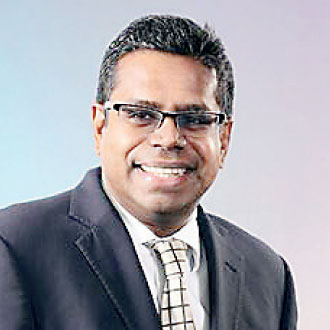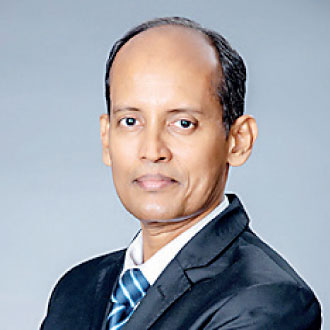Monday Feb 23, 2026
Monday Feb 23, 2026
Monday, 24 July 2023 01:34 - - {{hitsCtrl.values.hits}}

LFSBL Chairman D.P.N. Rodrigo

LFSBL GM and CEO Mihindu Rajaratne

LFSBL Chief Information Officer Hasitha Range Bandara
Lanka Financial Services Bureau Ltd. (LFSBL) recently concluded the first ever conference for the IS0 20022 message standards of the payments/settlements system worldwide in Colombo.
LFSBL is the only certified SWIFT shared infrastructures provider in Sri Lanka and owned by 22 shareholders in banking and the financial industry, which include the Central Bank of Sri Lanka, key state banks, leading commercial banks, primary dealers and the Central Depository System of Sri Lanka.
The first session was dedicated to the team from the Royal Monetary Authority of Bhutan.
LFSBL said this is a significant initiative in the process of change management from the current standards of financial messaging to the ISO 20022 standards, which technically transform messages to XML format. Messaging standard is a global initiative by SWIFT (Society for Worldwide Interbank Telecommunications) as a mandatory change in their global network.
Correspondent banking has extraordinary reach, facilitating cross-border payments, their confirmations and account statements the world over. The processes are connected to a highly reliable robust, secure network of financial institutions that instruct one another with a common, well-established language. The system has served the world well for several decades.
The next stage of transformation will come from data with better-quality in those payment processes, which will further improve the efficiency, speed and compliance of payments, enabling better customer experience and opportunities for extending services to new customers and businesses.
SWIFT IS0 20022 drives the progress towards better quality of data in payments is paramount as it will bring significant benefits in enhanced automation, faster processing, more effective reconciliations, improved levels in mitigation of financial crime risk, and better data-driven insights on the purpose and context for payments.
Better data is also a platform for innovation, enabling banks and third parties to offer new, value-added services for customers. Improvements in data need to happen consistently and end-to-end across client payment initiation, domestic payment systems, financial institutions and their payments providers.
In order to realise these significant benefits to the banking and financial industry, a modern data standard is required that is data rich, ensures consistent interpretation and is accepted across the industries and world.
ISO 20022 is that standard. It is an open international data standard being adopted around the world for domestic payments systems and will be adopted by the SWIFT community for cross-border payments and reporting.
The need for better quality data in payments is urgent and brings a number of significant benefits:
nIt enables counterparties, intermediaries and beneficiaries to increase automation in payments processing and reconciliation, reducing costly manual interventions, and improving visibility on cash flows and cash positions.
Better payments data cannot be achieved by any institution alone; it must be adopted in a coordinated way across the global payments ecosystem. It must be comprehensive. Well-structured and correctly labelled data must be sourced from clients at the point of payment initiation and carried across payment systems and correspondents in a consistent manner. This will avoid instances of data truncation, misinterpretation and ultimately breakdown of quality of service.
LFSBL, as the only certified SWIFT shared infrastructure provider in Sri Lanka, recognises the strategic importance of this global development and drive by SWIFT in transforming the message standards to IS0 20022 to enhance the efficiency and effectiveness of the payment ecosystem and quality of service to customers. LFSBL has also planned to offer ‘customised training’ advisory, technical support and implementation to the local SWIFT/Banking community and SAARC region.
LFSBL Chief Information Officer Hasitha Range Bandara said that the institutions must make preparations in advance, identifying the business, technical and operational requirements to be adapted with the ISO 20022 in order to ensure a seamless migration to the new standard.
General Manager and CEO Mihindu Rajaratne said that the LFSBL has partnered with global certified consultants to support the change management process of ISO 20022 to all potential customers and leading the way to support the SWIFT initiative and local initiatives driven by the Central Bank of Sri Lanka.